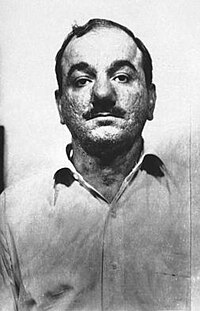Philip Testa
This article needs additional citations for verification. (December 2010) |
Philip Testa | |
|---|---|
 Testa's 1956 PPD mugshot | |
| Born | Philip Charles Testa April 21, 1924 Philadelphia, Pennsylvania, U.S. |
| Died | March 15, 1981 (aged 56) Philadelphia, Pennsylvania, U.S. |
| Cause of death | Bombing |
| Resting place | Holy Cross Cemetery, Yeadon, Pennsylvania, U.S. |
| Other names | "The Chicken Man", "The Julius Caesar of the Philadelphia Mob", "Philly" |
| Occupation | Crime boss |
| Spouse | Alfia Arcidiacono |
| Children | Salvatore and Maria |
| Allegiance | Philadelphia crime family |
Philip Charles Testa (April 21, 1924 – March 15, 1981), also known as "The Chicken Man", was an Italian-American mobster known for his brief leadership of the
Testa's nickname came from his involvement in a poultry business[citation needed]. About a year after Bruno's death, Testa was killed by the blast of a nail bomb at his home in South Philadelphia. The assassination was allegedly ordered by Testa’s own underboss, Peter Casella, as part of the first Philadelphia Mafia War.
Early life
Testa was born to Sicilian immigrants in Philadelphia, Pennsylvania, and lived in South Philadelphia with his family in his teenage years. In South Philadelphia he met and befriended future mob boss Angelo Bruno. He later married Alfia Arcidiacono (records show her family owned a farm in Salem County, New Jersey). In early police dossiers on Testa, he was identified by law enforcement as not having a legitimate source of income and was solely dependent from winnings as a "common gambler."
Testa and his wife had a son who also became involved in organized crime, Salvatore Testa, and was killed three years after his father.[1]
In 1970, Testa became underboss of Angelo Bruno. When Bruno was murdered in 1980, Testa became boss, appointing Nicodemo Scarfo as consigliere.
Death and aftermath

One month before Testa was murdered, he, Frank Narducci Sr., Harold and Mario Riccobene,
Testa's murder sparked a war within the family. Nicodemo Scarfo seized the top position for himself, promoting his long time friend Chuckie Merlino as his underboss and Testa loyalist Frank Monte as his consigliere.[3][4] Scarfo went on to lead the family for a decade with a bloody rampage, fueled by paranoia and aggression.[5]
In popular culture
Testa's violent death is referenced in the opening lines of musician Bruce Springsteen's song "Atlantic City".[6] He was portrayed by Larry Romano in the film The Irishman.[7]
See also
- List of unsolved murders
References
- ISSN 0362-4331. Retrieved 2020-04-15.
- ISBN 978-1592401420.
- Tribune Media Services. May 4, 2001. Retrieved 10 March 2016.
- ^ "Mob Violence Is Personal For Narducci's Sons". Philly.com. Retrieved 10 March 2016.
- Huffington Post. New York City. December 11, 2016. Retrieved March 10, 2016.
- ISBN 978-1-4422-3066-8. Retrieved 21 January 2021.
- ^ https://www.imdb.com/title/tt1302006/fullcredits
Further reading
- Anastasia, George (2004). Blood and Honor: Inside the Scarfo Mob - The Mafia's Most Violent Family. ISBN 0940159864.
External links
- Philip "Chickenman" Testa at Find A Grave
